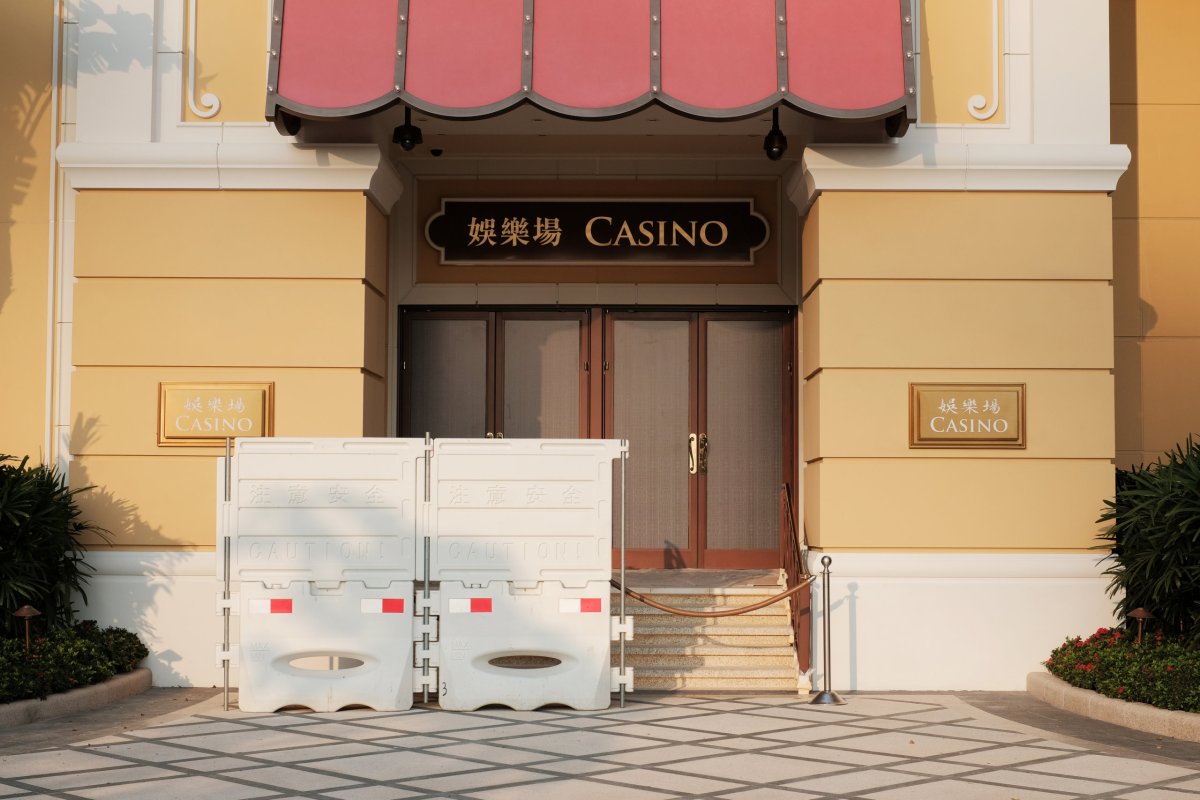HONG KONG (Reuters) – The vast, glitzy gaming halls of Macau are open, but thousands of baccarat tables are empty. The world’s biggest gambling hub has barred entry to most travellers and hotels are being used to isolate new arrivals in case they have been infected by coronavirus.
In Las Vegas, the casinos have been forced to close in order to prevent the spread of the disease. The same has happened in Australia, South Korea, the Philippines and Cambodia.
The global business of gambling – which thrives on air travel and large groups of people in close proximity – is one of the hardest hit as the world goes into lockdown.
The S&P 500 casinos and gaming index has lost 51% this year, more than double the 24% dip in the S&P 500.
Macau’s gaming revenue fell 80 percent in March from the year before, according to government figures. It fell 88 percent in February when authorities suspended casino operation for two weeks. Analysts expect April’s numbers to show an even sharper drop.
The former Portuguese colony, now a special administrative region of China, gets more than 80% of tax revenues from the gaming industry, which employs about three quarters of the territory’s 600,000 population, either directly or indirectly.
Macau’s government said last week it was “ready for the worst” and pledged to support small businesses and workers financially. It is effectively leaving casino operators – which have reaped huge profits over the past two decades of rapid growth – to deal with the dip in business themselves.
“This is a test to the new government and a big test to the six gaming operators,” Macau leader Ho Iat Seng said last week as he criticized the casinos for not initially cooperating with a government plan to use their hotels as quarantine facilities, although some have relented. “What social responsibilities should they bear?” he asked.
Macau’s government has forced operators to safeguard the livelihoods of gaming workers, ordering one company last month to rehire over 200 staff it had laid off due to the drop in business caused by the coronavirus.
Following that incident, Macau’s gaming regulator sent notices to all casinos warning them to maintain employment of their local staff, it said in an email to Reuters.
That puts additional pressure on Macau’s casino operators – Sands China Ltd <1928.HK>, Wynn Macau Ltd <1128.HK>, Galaxy Entertainment Group <0027.HK>, Melco Resorts & Entertainment Ltd <MLCO.O>, SJM Holdings Ltd <0880.HK> and MGM China – as uncertainty looms over what the government will do ahead of the expiration of their operating licenses in 2022.
They are already feeling financial pain, spending between $1.5 million to $4 million each day just to stay open, according to analysts, as revenues approach zero. Bigger operators like Sands and Galaxy would normally rake in $25 million in revenue a day.
Given the government’s support, workers are not panicking about losing their jobs, at least yet.
“Many people in Macau can feel the government is helping,” said Tai Wai Hang, vice chairman of Macau’s Gaming Employees Home, a local labour group.
Casino workers’ primary concern is being infected.
“There’s not enough prevention. They don’t separate the security, the visiting medical staff and us, what’s the point of being quarantined?” said a restaurant worker who identified himself only as Li, at a hotel designated for quarantine.
Macau’s government has reported 41 cases of coronavirus but no deaths.
VEGAS CLOSED
In the United States, Nevada forced all casinos to close in mid-March, prompting mass layoffs.
The state’s casinos – alongside most other U.S. companies – are eligible to tap into a $454 billion financial assistance package for impacted businesses included in the U.S. government’s $2 trillion relief plan passed by Congress last week, according to the American Gaming Association.
How much that will help companies like Las Vegas Sands Corp <LVS.N>, Wynn Resorts Ltd <WYNN.O> and MGM Resorts International <MGM.N> is hard to tell.
“This is unprecedented compared to anything I’ve experienced in 40 years of working in the industry,” said Debra Jeffries, a cocktail server at Bally’s Las Vegas, owned by Caesars Entertainment Corp <CZR.O>, who lost her job along with many others when casinos closed.
Jeffries said she will apply for unemployment benefits from the state and could last a little while longer due to her savings, but said most of her colleagues live pay cheque to pay cheque. “We don’t know how long this is going to last,” she said.
The Nevada Resort Association said the situation was not sustainable and the state’s unemployment rate could hit 30%, with 320,000 employees relying on $1.3 billion in wages and salary per month at immediate risk.
As of Tuesday, Nevada’s Clark County, which includes Las Vegas, had reported 961 cases of coronavirus and 28 deaths. https://graphics.reuters.com/HEALTH-CORONAVIRUS-USA/0100B5K8423/index.html
In South Korea, shuttered casinos have put thousands of employees on temporary leave, while Australia’s Star Entertainment Group <SGR.AX> said it was laying off 90% of its 9,000 or so employees.
South Korea has reported 9,887 coronavirus cases and 165 deaths, while Australia has reported 4,864 cases and 21 deaths. For an interactive graphic tracking the global spread of the coronavirus, open https://tmsnrt.rs/3aIRuz7 in an external browser.
An official at South Korea’s largest casino operator by revenue, Kangwon Land Inc <035250.KS>, said nearly 80% of its employees had been put on temporary leave.
Companies dependent on the casinos for business have been impacted.
“It (business) is expected to get worse as time passes and we are going to have to close some time before April 6,” said the manager of a 62-room hotel located near Kangwon Land, who asked not to be named as he was not authorized to speak to the media.
In Australia, Star Chairman John O’Neill said: “This is a unique environment and one beyond our control in which we’re determined to balance the necessary measures needed to protect the business while considering the considerable human impact to our workforce.”
(Additional reporting by Pak Yiu in Hong Kong, Helen Coster in New York and Joyce Lee in Seoul; Editing by Bill Rigby)
538598,538599,538600,538601,”]






















